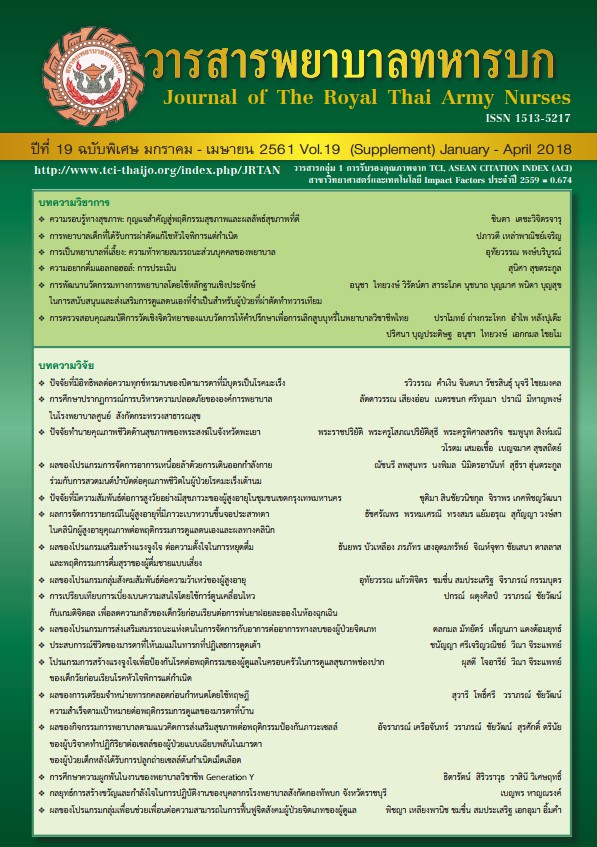The Effect Of Negative Symptoms Self- Management Program On Functioning Of Schizophrenic Patients With Negative Symptoms
Keywords:
schizophrenia, negative symptoms, functioning, negative symptom self- management programAbstract
This study was a quasi-experimental pretest-posttest control group design. The objectives were: 1) to compare the functioning of schizophrenic patient with negative symptoms before and after received the negative symptoms self-management program and 2) to compare the functioning of schizophrenic patient with negative symptoms who received negative symptoms self-management program and those who received regular nursing care activities. Forty of schizophrenic patient received services in in-patient department, Srithanya Hospital, who met the inclusion criteria, were matched pairs and then randomly assigned to experimental group and control group, 20 subjects in each group. The experimental group received the negative symptoms self-management program composed of 7 group activities to improve knowledge and relevant skills including self-management, negative symptom, use of cognitive negative symptom management techniques, self- care on daily life, medication management, emotional management, communication, and utilization of community resourses. The control group received regular nursing care activities. Research instruments were: 1) The negative symptoms self-management program, 2) The Life Skill Profile, and 3) The negative symptoms subscale of Positive and Negative Syndrome Scale. All instruments were validated for content validity by 5 professional experts. The Chronbach’ s Alpha coefficient reliability of the Life Skill Profile and the negative symptoms subscale of Positive and Negative Syndrome Scale was 0.94 and 0.90, respectively. Major findings were as follows:
1. The functioning of schizophrenic patients with negative symptoms who received the negative symptoms self-management program was significantly higher than that before, at p .05 level;
2. The functioning of schizophrenic patients with negative symptoms who received the negative symptoms self-management program was significantly higher than those who received regular nursing care activity, at p .05 level.
Downloads
References
2. McGrath J, Saha S, Chant D, Welham J. Schizophrenia: A Concise Overview of Incidence, Prevalence, and Mortality. Epidemiol Reviews. 2008; 30(1):67-76.
3. Phanthunane P, Vos T, Whiteford H, Bertram M, Udomratn P. Schizophrenia in Thailand: prevalence and burden of disease. Popular Health Metrics. 2010; 8(24):1-8.
4. Hunter R, Barry S. Negative symptoms and psychosocial functioning in schizophrenia: Neglected but important targets for treatment. European Psychiatry. 2012;27(6):432-6.
5. Knapp, Martin, McCrone, R. P, Leeuwemkamp, Oscar. Associations between negative symptoms, service patterns, and costs in patients with schizophrenia in the five European countries. Clinical Neuropsychiatry. 2008; 5(4):195-205.
6. Velligan DI, Alphs L, Lancaster S, Morlock R, Mintz J. Association between changes on the Negative Symptom Assessment scale (NSA-16) and measures of functional outcome in schizophrenia. Psychiatry Research. 2009; 169(2):97-100.
7. American Psychiatric Association. Diagnostic and statistical manual of mental disorders. 4th ed. Washington, DC: American Psychiatric Association. 1994.
8. Lindenmayer J-P. Increasing Awareness of Patient Functional Impairment in Schizophrenia and Its Measurement. Primary Psychiatry. 2008; 15(1):89-93.
9. Chan SW-c. Global Perspective of Burden of Family Caregivers for Persons With Schizophrenia. Archives of Psychiatric Nursing. 2011; 25(5): 339-49.
10. Erickson M, Jaafari N, Lysaker P. Insight and negative symptoms as predictors of functioning in a work setting in patients with schizophrenia. Psychiatry Research. 2011; 189(2):161-5.
11. Valencia M, Rascon ML, Juarez F, Murow E. A psychosocial skills training approach in Mexican out-patients with schizophrenia Psychological Medicine. 2007; 37(10):1393-402.
12. Lorig K, Ritter PL, Pifer C, Werner P. Effectiveness of the Chronic Disease Self-Management Program for Persons with a Serious Mental Illness: A Translation Study. Community Mental Health Journal. 2013; 50(1):96-103.
13. Bandura A. Self-efficacy: The exercise of control. New York: Freeman; 1997.
14. Barlow J, Wright C, Sheasby J, Turner A, Hainsworth J. Self-management approaches for people with chronic conditions: a review. Patient Education and Counseling. 2002; 48(2):177-87.
15. Ellis A. Rational Psychotherapy and Individual Psychology. Journal of Individual Psychology. 1957; 13(38-44).
16. Nilchaikovit T, Uneanong S, Kessawai D, Prakarn-Thomyangkoon. The Thai version of the Positive and Negative Syndrome Scale (PANSS) for schizophrenia: criterion validity and interrater reliability. J Med Assoc Thai. 2000; 83(6):646-51. (in Thai)
17. Rosen A, Hadzi-Pavlovic D, Parker G. The life skills profile: a measure assessing function and disability in schizophrenia. Schizophr Bulletin. 1989; 15(2):325-37.
18. Lawn S, Battersby m W, Pols RG, Lawrence J, Mick TPa. The Mental Health Expert Patient: Findings from a Pilot Study of a Generic Chronic Condition Self-Management Programme for People with Mental illness. International Journal of social Psychiatry. 2007; 53:12.
19. Ryan P, Sawin Kj. The Individual and Family Self-management Theory: Background and Perspective on Context, Process, and Outcomes. Nurs Outlook. 2009; 57(4):217-25.
20. Stithyudhakarn S. The Effect of A Symptom Self-Management on Psychotic Symptoms for Multiple episodes Schizophrenic Patients: a thesis Doctor of Nursing Chulalongkorn University 2009. (in Thai)
21. Mausbach BT, Moore RC, Davine T, Cardenas V, Bowie CR, Ho J, et al. The use of the Theory of Planned Behavior to predic engagement in functional behaviors in schizophrenia. Psychiatry Research. 2013; 205:36-42.
22. Sangeunboonyapong N, Puapan S. Factor Relating to Loss to Follow-up Amomgschizophrenia Patients Enrolled in The Community Hospital in Chachoengsao Province. Journal of The Royal Thai Army Nurses. 2560; 18(1):229-36. (in Thai)
Downloads
Published
How to Cite
Issue
Section
License
บทความหรือข้อคิดเห็นใดใดที่ปรากฏในวารสารพยาบาลทหารบกเป็นวรรณกรรมของผู้เขียน ซึ่งบรรณาธิการหรือสมาคมพยาบาลทหารบก ไม่จำเป็นต้องเห็นด้วย
บทความที่ได้รับการตีพิมพ์เป็นลิขสิทธิ์ของวารสารพยาบาลทหารบก
The ideas and opinions expressed in the Journal of The Royal Thai Army Nurses are those of the authors and not necessarily those
of the editor or Royal Thai Army Nurses Association.






